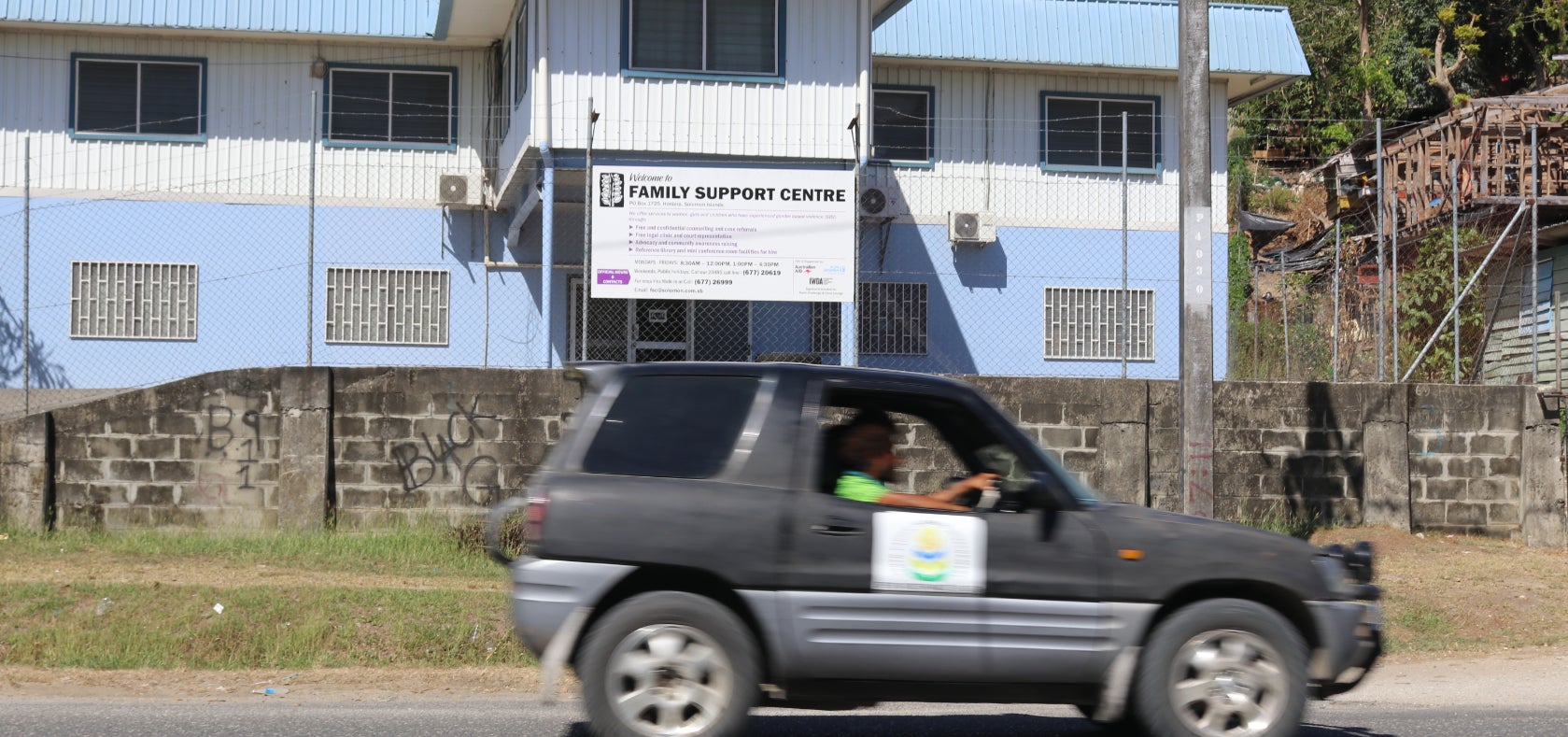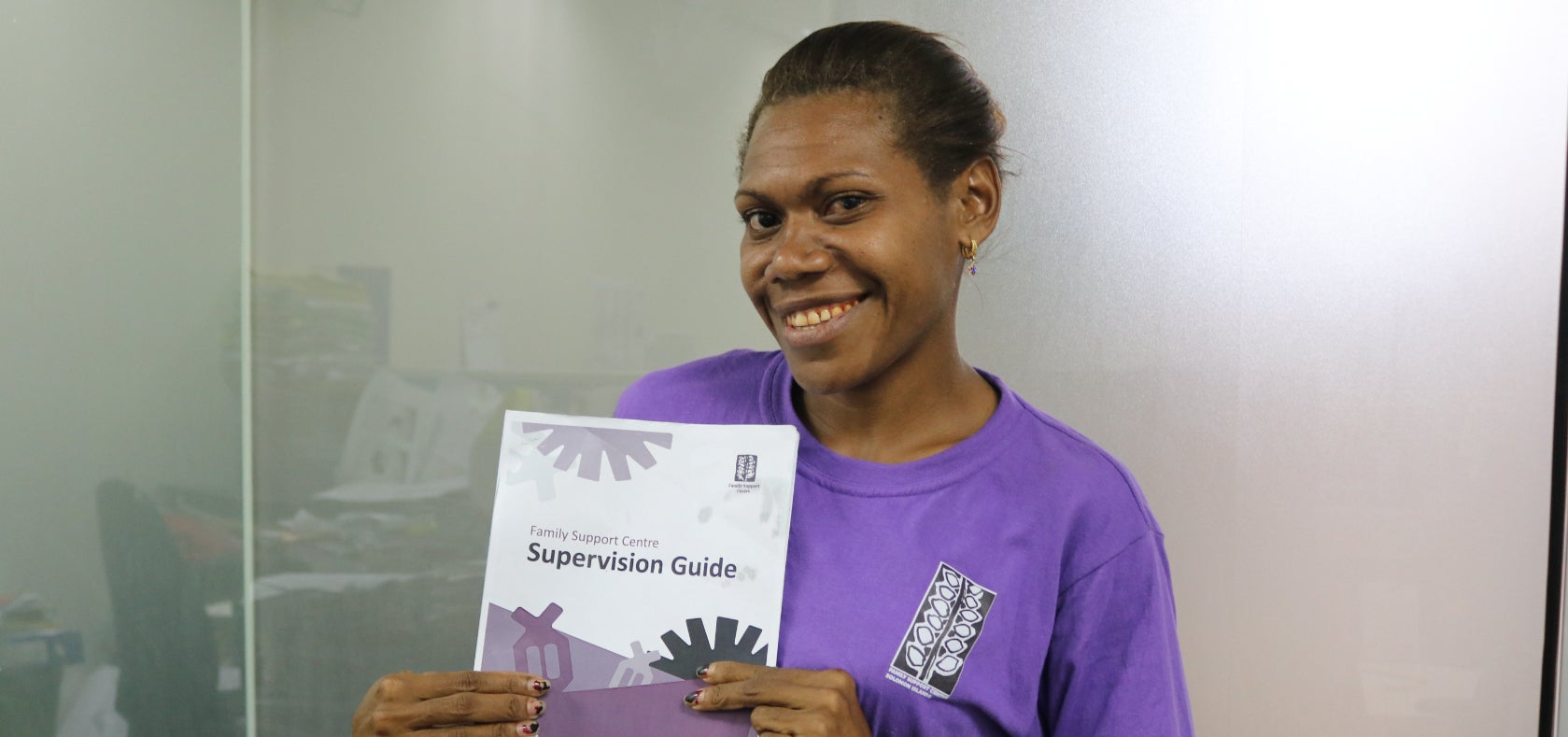Reaching survivors of violence in remote communities of the Solomon Islands
Date:

“Women run to us crying, saying [perpetrators] are coming to get them. But in Neo Island where we live, there is no police presence; there is no hospital,” says Sophie Rolyn, a 30-year-old team leader at the Neo Provincial Committee of the Family Support Center (FSC), a crisis center for women and girls providing gender-based violence (GBV) counselling services.
At 6 a.m., weather permitting, she sets off from Neo Island in the Temotu province of Solomon Islands, embarking on a 20-kilometre journey across the water, with a woman survivor of violence onboard. Her goal is to refer the survivor to support services to help her heal and break the cycle of violence.
In Santa Cruz Island, an hour-long boat ride from Neo Island, there is a police station, a hospital, and a crisis centre, all providing specialised gender-based violence (GBV) services. Rolyn had requested the provincial police to come to Neo Island to issue a Police Safety Notice - a temporary restraining order against the perpetrator. But the police had no fuel to reach Neo Island by boat.
“Distance is a big issue in Neo. If we wait for the police to arrive, the perpetrator will continue to abuse the woman. So, we are getting a transport to go to the police station ourselves,” says Rolyn, who is comforting the survivor, and determined to save her life.
Once in Santa Cruz, their first stop is the police station. Depending on the survivor’s needs, Rolyn will accompany her to receive legal support, medical treatment, or longer-term accommodation. Rolyn has just introduced the survivor to the Temotu Provincial SAFENET GBV response referral and response system.
Temotu Province, home to Neo Island and Santa Cruz Island, which are about 12 kilometres apart, consists of twenty islands scattered across the far eastern part of Solomon Islands. The province has long been considered ‘forgotten,’ because of its remoteness, high travel costs between islands and limited services availability, creating a culture of impunity for gender-based violence.
“At school, teachers often beat up students when they don’t follow instructions. At home, we hear mothers crying and fathers chasing children out of the house. Violence is a big issue in our community,” says Rolyn.

Over the past decade, the Solomon Islands has made remarkable progress in preventing and responding to gender-based violence through SAFENET, a national GBV response service delivery network.
However, in a country where 64 percent of women have experienced gender-based violence, and with approximately 49 percent of the population being women, most services and programmes remain concentrated in the capital, Honiara. This leaves 87 percent of the population residing in rural or remote areas with limited access to these critical services. As a result, survivors in these regions are far less likely to receive the support they need. Without intervention, violence can quickly escalate into more severe forms.
Overcoming distance to deliver GBV services
To overcome the geographical barriers, the Temotu Provincial Government established the provincial SAFENET Committee in 2019, creating a local network of trained frontline service providers. In 2020, the Temotu Provincial referral pathways were developed, connecting island-based community groups with provincial service providers to improve access to vital services for survivors in remote locations.
On Neo Island, which has a population of approximately 1,700, the Family Support Center - a SAFENET member - has established a provincial committee. This committee serves as the first point of contact for those looking for information on available services. It also provides GBV counselling for survivors and helps them gain access to essential services through referrals.
"If a survivor is in immediate danger, I call the police straight away. When service providers fail to respond appropriately, I report it to the SAFENET Committee," shares Rolyn, who is one of 26 frontline service providers in Temotu who received UN Women's training on survivor-centered service delivery and case management.
Once Rolyn introduces the survivor from Neo to the Temotu Provincial SAFENET, she will oversee the survivor’s case from entry into SAFENET to completion and reports the matter when a service provider fails to provide quality services for the survivor.
Vaela Falefehi Ngai, Director of the Women’s Development Division at the Ministry of Women, Youth, Children, and Family Affairs, applauds the “excellent rollout” of SAFENET to the provinces. "This success was the result of years of learning and adaptation with provincial governments. These governments now take ownership in ensuring quality and coordination among service providers, and UN Women's approach has been instrumental in this progress," affirms Director Ngai.
Doris Puiahi, the Ending Violence Against Women Girls Coordinator at UN Women who oversees the Pacific Partnership programme in Solomon Islands, says "UN Women's strength lies in connecting prevention and response work. While there is still work to be done, UN Women remains committed to bringing together diverse stakeholders to deliver ethical interventions to address gender-based violence, extending its reach to even the most remote communities.”
Promoting prevention and empowering communities to seek help
As part of the SAFENET initiative, access to essential services is combined with community engagement to prevent violence from occurring in the first place.
The Neo provincial committee supports church leaders to discuss human rights and unequal power relations between husbands and wives during Bible study. In addition, teachers are trained in non-violent disciplinary methods. “When they recognise power dynamics within relationships and its impact on the community, they return to their schools with a new perspective to influence positive change”, explains Rolyn. In addition, regular meetings are organised with church leaders, teachers, women, and youth for open discussion on gender inequality and power relations – issues often seen as some of the main root causes of violence against women.
"I've seen big changes in our community," says Rolyn. "Previously, men made all decisions at home, in public meetings, and churches. Women sat at the back and listened to what men decided. But now, people recognize women as good decision-makers, and the status of women is rising. We now have three women chiefs on our island. When women are abused or sexually harassed, they come and see us. Women and girls are gaining confidence to speak up," she adds.
In 2021, 1,515 survivors sought help from FSC, a significant increase from 252 in 2019. However, in 2022, only 658 survivors reached out to FSC, a decrease attributed to the challenges in reporting associated with the COVID-19 community transmission in the Solomon Islands.
UN Women is a longstanding partner of the Government of Solomon Islands and the Family Support Center. SAFENET, led by the Ministry of Women, Youth, Children and Family Affairs and supported by key multisectoral partners, receives significant backing from UN Women through the Pacific Partnership to End Violence Against Women and Girls. This programme is primarily funded by the Government of Australia, the European Union, and is jointly coordinated by UN Women and the Pacific Community (SPC), in collaboration with the Pacific Islands Forum (PIF). Now in its second phase (2023-2027), the Pacific Partnership builds on the success of the first phase (2018-2023), advancing innovative initiatives and partnerships to promote gender equality and end violence against women and girls across the region.